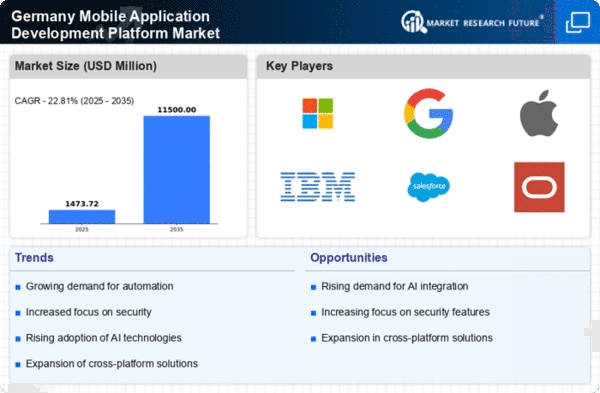Growing Demand for Mobile Solutions
The mobile application-development-platform market in Germany is experiencing a surge in demand for mobile solutions across various sectors. Businesses are increasingly recognizing the necessity of mobile applications to enhance customer engagement and streamline operations. According to recent data, the mobile app market in Germany is projected to reach €10 billion by 2026, indicating a robust growth trajectory. This demand is driven by the need for businesses to adapt to changing consumer behaviors, as mobile devices become the primary means of accessing services. Consequently, the mobile application-development-platform market is likely to benefit from this trend, as companies seek efficient platforms to develop and deploy mobile applications that meet user expectations.
Emphasis on User Experience and Design
In the competitive landscape of the mobile application-development-platform market, there is a pronounced emphasis on user experience (UX) and design. German consumers are increasingly discerning, expecting applications to be intuitive, visually appealing, and responsive. This shift in consumer expectations compels developers to prioritize UX in their mobile applications. Research indicates that applications with superior UX can lead to a 200% increase in user engagement. As a result, the mobile application-development-platform market is likely to evolve, with platforms that offer advanced design tools and UX capabilities gaining traction among developers aiming to meet these heightened standards.
Rising Adoption of Cloud-Based Solutions
The mobile application-development-platform market in Germany is witnessing a notable shift towards cloud-based solutions. As organizations increasingly migrate to cloud environments, the demand for mobile applications that leverage cloud capabilities is on the rise. This transition allows for greater scalability, flexibility, and cost-effectiveness in app development. Data suggests that cloud adoption among German businesses has reached approximately 60%, with many companies recognizing the advantages of cloud-based mobile application development. This trend is expected to bolster the mobile application-development-platform market, as developers seek platforms that facilitate seamless integration with cloud services, thereby enhancing the overall user experience.
Increased Investment in Digital Transformation
In Germany, organizations are allocating substantial resources towards digital transformation initiatives, which significantly impacts the mobile application-development-platform market. As companies strive to modernize their operations and improve customer experiences, the need for mobile applications becomes paramount. Reports indicate that over 70% of German enterprises are prioritizing digital transformation, with a significant portion of their budgets directed towards mobile app development. This trend suggests that the mobile application-development-platform market will continue to thrive, as businesses seek innovative solutions to enhance their digital presence and operational efficiency. The emphasis on mobile-first strategies is likely to drive further investment in development platforms.
Regulatory Compliance and Data Privacy Concerns
The mobile application-development-platform market in Germany is significantly influenced by regulatory compliance and data privacy concerns. With stringent regulations such as the General Data Protection Regulation (GDPR) in place, developers must ensure that their applications adhere to legal standards. This compliance requirement drives the demand for development platforms that incorporate robust security features and facilitate adherence to regulations. It is estimated that non-compliance can result in fines of up to €20 million or 4% of annual global turnover, emphasizing the importance of compliance in app development. Consequently, the mobile application-development-platform market is likely to see increased demand for solutions that prioritize security and regulatory adherence.
















